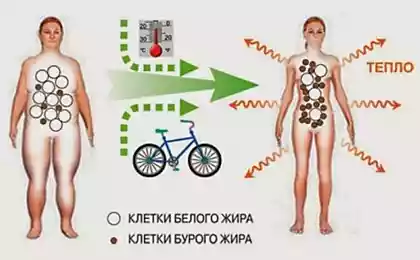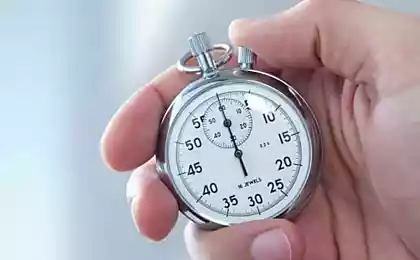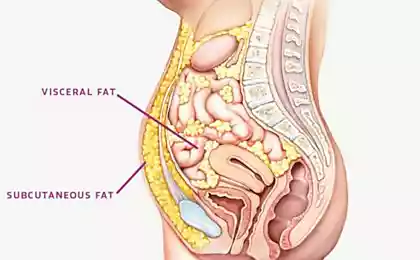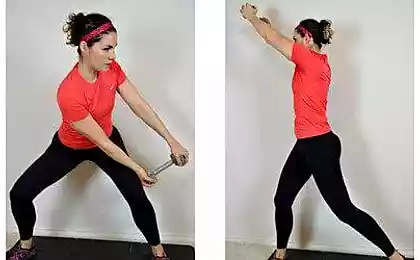611
Morning workout to burn fat
Most competitive bodybuilders are confident in the benefits of morning cardio before the first meal. They believe that it helps them to burn more fat and raises your metabolism for the day ahead. There are studies supporting this point of view, but scientists and physiologists do not agree with it. They support the hypothesis of the energy balance, which States: if you burn more calories than you consume in each 24-hour period, it doesn't matter when you burn them, and where they come from fat or from carbohydrates.
If you have at least basic knowledge in physiology, I must agree that your cardio is not the most important factor in fat burning. Train when you like, and follow a moderate diet are the most important rules.
Four million one hundred forty thousand four hundred twenty
However, there are arguments in favor of early training on an empty stomach. They sound so:
1. When you Wake up in the morning after 8-12 hours of fasting, the glycogen store is depleted. Training under these conditions cause the body to mobilize the fat, as glycogen is insufficient.
2. Food intake triggers the release of insulin, which prevents the mobilization of fat. In the morning in the body less of insulin, thus you will burn more fat at this time.
3. After a night's sleep blood less carbohydrates (glucose), so you can burn more fat.
4. If you eat right before a workout, you'll burn these carbs, not fat.
5. When you exercise in the morning, metabolism remains elevated all day. If you are satisfied with your cardio in the evening, you burn calories only at this time, which is very good, but you won't get increased metabolism in the hours that followed, as going to sleep.
Scientists support this theory. Research conducted at Kansas State University and published in Medicine and Science in Sports and Exercise, showed that subjects burned a kilogram of fat faster when trained on an empty stomach in the morning than when training at a different time of day. The researchers measured respiratory gas exchange, caloric expenditure, metabolism of carbohydrates and fatty acids and found that the number of calories released by by burning fat, 67% of the total cost of energy while working out in the morning after 12-hour fasting. This is well above the 50% rate of those who worked in other times of the day or immediately after a meal.
In another study, published in the Journal of Applied Physiology compared the effect of aerobic exercise on lipid oxidation with a full stomach and empty. The researchers concluded: "Our results support the hypothesis that training enhances lipid oxidation in men after a 12-hour overnight fast". And here is an excerpt from the article "Optimizing Exercise for Fat Loss": "the Ability of exercise to selectively promote fat oxidation optimal if training is conducted on an empty stomach during the morning of accelerated metabolism."
Despite the fact that the fact that the enhanced fat-burning during morning aerobics seems logical and is supported by scientists, most physiologists do not agree with this. The main argument is that you can always find a study to support almost any theory that you intend to protect. Interesting, but even the gray-haired academics agree that you will burn more fat than sugar, exercising on an empty stomach. The real question is, does it affect the common fat loss for a long period of time.
Sports physiologist Greg Landry, author of the Metabolism System for Weight Loss and Fitness, says: "I agree that you burn a few more fat as fuel, exercising on an empty stomach, but the real question is, does it really matter? I believe that there is a pool of calories stored in different forms throughout the body (fat, glycogen, etc.), from it we get the calories to burn. If now we took a little bit more fat, it is likely, then is obtained from food calories will make up for his loss, as glycogenic storage at that time will be more complete. All this pouring from one vessel to another".
Lyle McDonald, a nutrition expert at bodybuilding and the author of the book The Ketogenic Diet, agrees. He said that during the day our body compensates and it is ridiculous to follow such a strategy: "Everything you talk about research results is the fact that you'll burn more fat in this way, and I agree with that 100%. But while there is a General weight loss, it doesn't matter what you burn, important only 24-hour calorie balance. If you burn glucose during exercise, you burn more fat at other times of the day. If during exercise you burn fat, you burn more glucose then. The end result is the same. If this were not so, then such athletes like sprinters who never burn fat on your training, would not be lean. They burn so many calories that you retain a balance and not gain fat. So, while morning cardio and bring some psychological benefits to bodybuilders who like this program, I will not say that this is somehow reflected in the General decrease in the number of subcutaneous fat".
If we talk about getting rid of the fat, then hardly anyone more experienced in this matter than Chris'aceto. A high level bodybuilder and nutritionist, advising many of the world's leading professionals in bodybuilding, 'aceto a firm believer in morning cardio. He is, without a doubt, States: "Early let you to get rid of fat is morning cardio on an empty stomach."
He believes that look at the receipt and consumption of calories only in terms of energy is "limited." Success depends on a number of factors, not only on energy balance. We return to the eternal question of whether all calories the same? "Absolutely not! says'aceto. Calorie is not just a calorie. Any physiologist cringe when he hears such a thing."
"All these people are talking only about the receipt and expenditure of calories, continues Chris. — Judging by their statements, if I don't eat nothing but candy and Coca-Cola and eat 100 calories less than I need to maintain a normal weight, I immediately lose weight. We know it's not easy. We should not forget about the ratio of carbohydrates, proteins and fats. Then there is the frequency of meals: of the many data we know that we will get more muscle mass with 5-6 meals a day than three. It is not only calories, there are other factors".
There are more reasons why you should incorporate morning cardio in your schedule. Landry, despite his doubts about the importance of the source of fuel, said: "If I were asked to name the most important factor for a successful reset of the fat, I would choose a morning workout."
Here are a few arguments in their favor:
1. They will give you a great feeling all day, thanks to the release of mood enhancing endorphins.
2. They nourish you with energy and cheer.
3. They will help regulate your appetite all day.
4. Your biological clock will adjust to a morning workout, and it will be easier to Wake up in the morning.
5. The morning session will be more successful than those when you are tired working day, and friends entice you with a drink.
6. You can always find time for exercise, set the alarm a little early.
7. A morning workout will raise your metabolism for the whole day.
Of all these advantages most often discuss the past. Scientists call this phenomenon the "additional poslenarkoznogo oxygen consumption".
Tracking only the number and type of calories burned during a workout will not give you the full picture. You must take into account the calories that your increased metabolism will continue to burn after it. Yes, that's right. Work out in the morning and you'll burn calories all day. Imagine that you are sitting at work and fat is burned! It's good, but the bad news is that the additional poslenarkoznogo oxygen consumption is not so great as many think.
It is a myth that your metabolism remains elevated 24 hours after exercise. This happens only after highly intensive or long-lasting exertion, such as marathon.
After training with low intensity value additional poslenarkoznogo oxygen consumption is so small that its impact on fat loss and say no. You burn somewhere 9-30 extra calories after exercise with the intensity at 60-65% of maximum heart rate. In other words, ordinary run on the moving treadmill almost do nothing to enhance your metabolism.
Additional poslenarkoznogo oxygen consumption, however, increases with the intensity and duration of exercise. According to Wilmore and Costello in their Phisiology of Sport and Exercise, additional poslenarkoznogo oxygen consumption after moderate exercise (75-80%) increases by about 0.25 calories per minute or 15 calories per hour. This will lead to additional spending 75 calories. It seems that the figure is low, but if to count, for the year (in theory) you will lose the extra 2.5 kg of fat due to the calories burned after the workout.
Best results allows to achieve high-intensity interval training.
You alternate periods of high (85% of maximum and higher) intensity with short periods of low. Research high intensity interval training demonstrated a much higher poslenarkoznogo additional oxygen consumption, which can significantly increase daily energy expenditures. In one study, researchers at the University of Alabama observed the impact of two training programs on daily energy expenditure. The first group worked on the bikes for 60 minutes, with average intensity, the second was trained according to the program of high-intensity interval training: two minutes of high-intensity work on the bike and two minutes of low-intensity. The second group burned more calories in 24 hours than the first. All this may result in loss of the additional 5 kg of fat per year, provided that they will do instead of the normal training high intensity interval training five days a week.
Paradoxically, working with weights is much more additional poslenarkoznogo oxygen consumption than normal aerobic. Studies show that the metabolic rate remains elevated for 4-7% within 24 hours after the training. Yes, this means that bodybuilding burns fat through some indirect mechanisms. For someone who spends 2,500 calories per day, this would translate into burning more 100-175 calories after the workout. The lesson is simple: anyone who wants to lose weight and have not engaged in bodybuilding, must first go to the training. Then, and only then, you can start thinking about the morning cardio!
All interested in the effects of aerobics, especially high-intensity, in terms of the danger of losing muscle. After an overnight fast, the glycogen levels, glucose and insulin levels low. As you can guess, this is the optimal environment for fat burning. Unfortunately, these same conditions are optimal for burning muscle because carbohydrate is low and the levels of the catabolic hormone cortisol are high. It would seem, morning cardio is a double — edged sword, but to avoid loss of muscle tissue possible.
All aerobic exercise to some extent, affect the muscles, but if you don't overdo it, then the fear of loss of muscle tissue is not necessary. It is true that your body during aerobic exercise breaks down muscle proteins for energy, but it destroys and rebuilds muscle fibers constantly and throughout the body. This process is called protein turnover and it is essential for normal functioning. Your goal is to increase its anabolic component and to reduce the catabolic just enough to remain in an anabolic state, that is, to gain (or at least preserve) muscle mass.
How to build muscle more than lose?
Initial — avoid excessive cardio. 'aceto proposes to limit the the morning training on an empty stomach to 30 minutes, then the "least likely amino acid to be used as fuel". He also mentions that "a strong Cup of coffee will help to burn more fat than glycogen. But if you can spare glycogen, you'll keep the protein". You can also experiment with a thermogenic mixture of ephedrine, caffeine and aspirin, or similar medicines based on herbs.
Following item is to provide your body the proper nutritional support. Errors in diet more often than strictly aerobic, can cause loss of muscle mass. To retain muscle, eat right all day, which includes an adequate frequency of meals, amounts of carbohydrate, protein and proteins to the total calorie.
And thirdly, train with heavy weights even in the phase of getting rid of fat. Is a mistake to think that small weights and high reps will help you to become lean. That helped build up the muscles, and will help to preserve them.
You will be shocked by the prospect of losing hard-earned muscle, but you still want to benefit from the fat-burning morning cardio? One option resorted to by many bodybuilders is protein food or cocktail 30-60 minutes before morning workout. Protein without the carbohydrates will minimize the insulin response and allows you to mobilize fat simultaneously supplying amino acids to the body, preventing muscle breakdown.
It is obvious that the morning cardio have a number of indisputable advantages that make many just to get up early in the morning. But let's try to summarize. Do morning training contribute greater losses of body fat than carried out at a different time of day? Experience, common sense and the results of the experiments allow us to say that Yes. However, the debate continues and further research is needed. At the time, as scientists in their labs are busy with measurements of gas exchange, the cost of calories and levels of basic utilization, I am going to get up at six in the morning to get on a cardio machine. published
P. S. And remember, only by changing their consumption — together we change the world! ©
Source: vk.com/sport_stat
If you have at least basic knowledge in physiology, I must agree that your cardio is not the most important factor in fat burning. Train when you like, and follow a moderate diet are the most important rules.
Four million one hundred forty thousand four hundred twenty
However, there are arguments in favor of early training on an empty stomach. They sound so:
1. When you Wake up in the morning after 8-12 hours of fasting, the glycogen store is depleted. Training under these conditions cause the body to mobilize the fat, as glycogen is insufficient.
2. Food intake triggers the release of insulin, which prevents the mobilization of fat. In the morning in the body less of insulin, thus you will burn more fat at this time.
3. After a night's sleep blood less carbohydrates (glucose), so you can burn more fat.
4. If you eat right before a workout, you'll burn these carbs, not fat.
5. When you exercise in the morning, metabolism remains elevated all day. If you are satisfied with your cardio in the evening, you burn calories only at this time, which is very good, but you won't get increased metabolism in the hours that followed, as going to sleep.
Scientists support this theory. Research conducted at Kansas State University and published in Medicine and Science in Sports and Exercise, showed that subjects burned a kilogram of fat faster when trained on an empty stomach in the morning than when training at a different time of day. The researchers measured respiratory gas exchange, caloric expenditure, metabolism of carbohydrates and fatty acids and found that the number of calories released by by burning fat, 67% of the total cost of energy while working out in the morning after 12-hour fasting. This is well above the 50% rate of those who worked in other times of the day or immediately after a meal.
In another study, published in the Journal of Applied Physiology compared the effect of aerobic exercise on lipid oxidation with a full stomach and empty. The researchers concluded: "Our results support the hypothesis that training enhances lipid oxidation in men after a 12-hour overnight fast". And here is an excerpt from the article "Optimizing Exercise for Fat Loss": "the Ability of exercise to selectively promote fat oxidation optimal if training is conducted on an empty stomach during the morning of accelerated metabolism."
Despite the fact that the fact that the enhanced fat-burning during morning aerobics seems logical and is supported by scientists, most physiologists do not agree with this. The main argument is that you can always find a study to support almost any theory that you intend to protect. Interesting, but even the gray-haired academics agree that you will burn more fat than sugar, exercising on an empty stomach. The real question is, does it affect the common fat loss for a long period of time.
Sports physiologist Greg Landry, author of the Metabolism System for Weight Loss and Fitness, says: "I agree that you burn a few more fat as fuel, exercising on an empty stomach, but the real question is, does it really matter? I believe that there is a pool of calories stored in different forms throughout the body (fat, glycogen, etc.), from it we get the calories to burn. If now we took a little bit more fat, it is likely, then is obtained from food calories will make up for his loss, as glycogenic storage at that time will be more complete. All this pouring from one vessel to another".
Lyle McDonald, a nutrition expert at bodybuilding and the author of the book The Ketogenic Diet, agrees. He said that during the day our body compensates and it is ridiculous to follow such a strategy: "Everything you talk about research results is the fact that you'll burn more fat in this way, and I agree with that 100%. But while there is a General weight loss, it doesn't matter what you burn, important only 24-hour calorie balance. If you burn glucose during exercise, you burn more fat at other times of the day. If during exercise you burn fat, you burn more glucose then. The end result is the same. If this were not so, then such athletes like sprinters who never burn fat on your training, would not be lean. They burn so many calories that you retain a balance and not gain fat. So, while morning cardio and bring some psychological benefits to bodybuilders who like this program, I will not say that this is somehow reflected in the General decrease in the number of subcutaneous fat".
If we talk about getting rid of the fat, then hardly anyone more experienced in this matter than Chris'aceto. A high level bodybuilder and nutritionist, advising many of the world's leading professionals in bodybuilding, 'aceto a firm believer in morning cardio. He is, without a doubt, States: "Early let you to get rid of fat is morning cardio on an empty stomach."
He believes that look at the receipt and consumption of calories only in terms of energy is "limited." Success depends on a number of factors, not only on energy balance. We return to the eternal question of whether all calories the same? "Absolutely not! says'aceto. Calorie is not just a calorie. Any physiologist cringe when he hears such a thing."
"All these people are talking only about the receipt and expenditure of calories, continues Chris. — Judging by their statements, if I don't eat nothing but candy and Coca-Cola and eat 100 calories less than I need to maintain a normal weight, I immediately lose weight. We know it's not easy. We should not forget about the ratio of carbohydrates, proteins and fats. Then there is the frequency of meals: of the many data we know that we will get more muscle mass with 5-6 meals a day than three. It is not only calories, there are other factors".
There are more reasons why you should incorporate morning cardio in your schedule. Landry, despite his doubts about the importance of the source of fuel, said: "If I were asked to name the most important factor for a successful reset of the fat, I would choose a morning workout."
Here are a few arguments in their favor:
1. They will give you a great feeling all day, thanks to the release of mood enhancing endorphins.
2. They nourish you with energy and cheer.
3. They will help regulate your appetite all day.
4. Your biological clock will adjust to a morning workout, and it will be easier to Wake up in the morning.
5. The morning session will be more successful than those when you are tired working day, and friends entice you with a drink.
6. You can always find time for exercise, set the alarm a little early.
7. A morning workout will raise your metabolism for the whole day.
Of all these advantages most often discuss the past. Scientists call this phenomenon the "additional poslenarkoznogo oxygen consumption".
Tracking only the number and type of calories burned during a workout will not give you the full picture. You must take into account the calories that your increased metabolism will continue to burn after it. Yes, that's right. Work out in the morning and you'll burn calories all day. Imagine that you are sitting at work and fat is burned! It's good, but the bad news is that the additional poslenarkoznogo oxygen consumption is not so great as many think.
It is a myth that your metabolism remains elevated 24 hours after exercise. This happens only after highly intensive or long-lasting exertion, such as marathon.
After training with low intensity value additional poslenarkoznogo oxygen consumption is so small that its impact on fat loss and say no. You burn somewhere 9-30 extra calories after exercise with the intensity at 60-65% of maximum heart rate. In other words, ordinary run on the moving treadmill almost do nothing to enhance your metabolism.
Additional poslenarkoznogo oxygen consumption, however, increases with the intensity and duration of exercise. According to Wilmore and Costello in their Phisiology of Sport and Exercise, additional poslenarkoznogo oxygen consumption after moderate exercise (75-80%) increases by about 0.25 calories per minute or 15 calories per hour. This will lead to additional spending 75 calories. It seems that the figure is low, but if to count, for the year (in theory) you will lose the extra 2.5 kg of fat due to the calories burned after the workout.
Best results allows to achieve high-intensity interval training.
You alternate periods of high (85% of maximum and higher) intensity with short periods of low. Research high intensity interval training demonstrated a much higher poslenarkoznogo additional oxygen consumption, which can significantly increase daily energy expenditures. In one study, researchers at the University of Alabama observed the impact of two training programs on daily energy expenditure. The first group worked on the bikes for 60 minutes, with average intensity, the second was trained according to the program of high-intensity interval training: two minutes of high-intensity work on the bike and two minutes of low-intensity. The second group burned more calories in 24 hours than the first. All this may result in loss of the additional 5 kg of fat per year, provided that they will do instead of the normal training high intensity interval training five days a week.
Paradoxically, working with weights is much more additional poslenarkoznogo oxygen consumption than normal aerobic. Studies show that the metabolic rate remains elevated for 4-7% within 24 hours after the training. Yes, this means that bodybuilding burns fat through some indirect mechanisms. For someone who spends 2,500 calories per day, this would translate into burning more 100-175 calories after the workout. The lesson is simple: anyone who wants to lose weight and have not engaged in bodybuilding, must first go to the training. Then, and only then, you can start thinking about the morning cardio!
All interested in the effects of aerobics, especially high-intensity, in terms of the danger of losing muscle. After an overnight fast, the glycogen levels, glucose and insulin levels low. As you can guess, this is the optimal environment for fat burning. Unfortunately, these same conditions are optimal for burning muscle because carbohydrate is low and the levels of the catabolic hormone cortisol are high. It would seem, morning cardio is a double — edged sword, but to avoid loss of muscle tissue possible.
All aerobic exercise to some extent, affect the muscles, but if you don't overdo it, then the fear of loss of muscle tissue is not necessary. It is true that your body during aerobic exercise breaks down muscle proteins for energy, but it destroys and rebuilds muscle fibers constantly and throughout the body. This process is called protein turnover and it is essential for normal functioning. Your goal is to increase its anabolic component and to reduce the catabolic just enough to remain in an anabolic state, that is, to gain (or at least preserve) muscle mass.
How to build muscle more than lose?
Initial — avoid excessive cardio. 'aceto proposes to limit the the morning training on an empty stomach to 30 minutes, then the "least likely amino acid to be used as fuel". He also mentions that "a strong Cup of coffee will help to burn more fat than glycogen. But if you can spare glycogen, you'll keep the protein". You can also experiment with a thermogenic mixture of ephedrine, caffeine and aspirin, or similar medicines based on herbs.
Following item is to provide your body the proper nutritional support. Errors in diet more often than strictly aerobic, can cause loss of muscle mass. To retain muscle, eat right all day, which includes an adequate frequency of meals, amounts of carbohydrate, protein and proteins to the total calorie.
And thirdly, train with heavy weights even in the phase of getting rid of fat. Is a mistake to think that small weights and high reps will help you to become lean. That helped build up the muscles, and will help to preserve them.
You will be shocked by the prospect of losing hard-earned muscle, but you still want to benefit from the fat-burning morning cardio? One option resorted to by many bodybuilders is protein food or cocktail 30-60 minutes before morning workout. Protein without the carbohydrates will minimize the insulin response and allows you to mobilize fat simultaneously supplying amino acids to the body, preventing muscle breakdown.
It is obvious that the morning cardio have a number of indisputable advantages that make many just to get up early in the morning. But let's try to summarize. Do morning training contribute greater losses of body fat than carried out at a different time of day? Experience, common sense and the results of the experiments allow us to say that Yes. However, the debate continues and further research is needed. At the time, as scientists in their labs are busy with measurements of gas exchange, the cost of calories and levels of basic utilization, I am going to get up at six in the morning to get on a cardio machine. published
P. S. And remember, only by changing their consumption — together we change the world! ©
Source: vk.com/sport_stat























